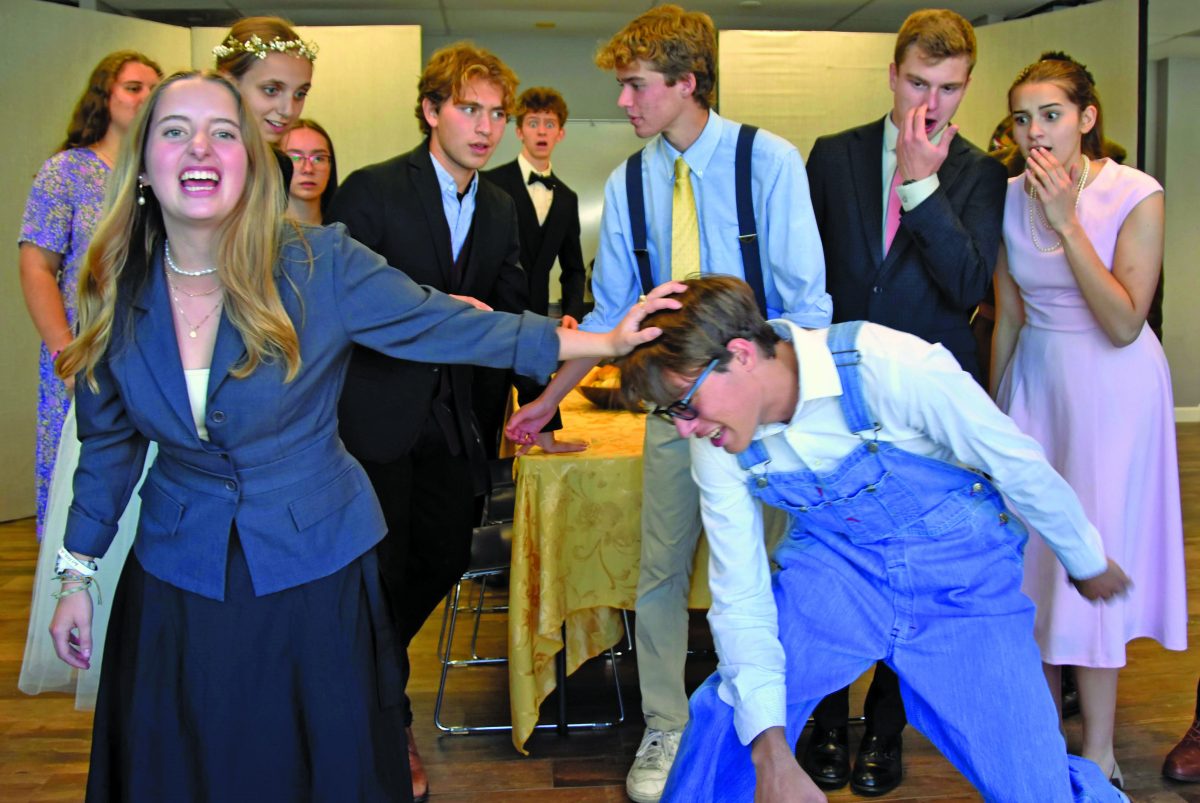
The 1936 comedy and love story for the stage, “You Can’t Take It with You” by George S. Kaufman and Moss Hart, is being revived at Falls Church’s Trinity School at Meadow View by the eleventh-grade class. In the tradition of “screwball comedies” of the era, a conventional type, Tony Kirby, is placed among a family of eccentrics, including Grandpa Martin Vanderhof and his philosophy of go against the grain and do what makes you happy; a ballet dancer, novelist, and xylophonist committed to little else; and fervent fireworks makers. Tony is willing to adapt to this unusual household and much more out of his love for Alice Syacmore of the said eccentric family. Tony’s businessman father and his conventional wife, however, may have other ideas as to how far they will go to accept Alice’s family’s unique and different ways.
Trinity School at Meadow View, currently celebrating its twenty-fifth anniversary since its founding in Falls Church, Virginia, is noted for a classics-based program that has an extensive drama class built into the curriculum. While preparing plays in which all students take part, students are encouraged to write analytic reflection papers, make parallels to literature, and “broaden horizons” by approaching works in a “tangible way,” says student Bethan Bray, who plays Essie Carmichael. Although the play has comedic moments, “You Can’t Take It With You” presents “relevant [themes] to a modern audience” and a “thought-provoking message” of whether one can devote oneself solely to a life of satisfaction. Eleventh-grader Tony Fraga states that “this play draws on the simple beauty of appreciating what one has gained in life and learning to chase after the things you have in the moment.”
Student Gigi Barth, who plays J-Man and Olga Katrina, comments: “‘You Can’t Take It with You’ contrasts its ideals of satisfaction against the typical idea of American success in the form of two families, the Sycamores (Grandpa Vanderhof’s family) and the Kirbys. The Sycamores are an admittedly peculiar family as each member follows his or her own passion relentlessly, although each character does not, in fact, have much skill to show for it. The Kirbys, in contrast, are something of the American ideal, with the father of the family being a wealthy CEO of a company on Wall Street and a son groomed to be his successor. Most would expect the Kirbys to be satisfied with their lives, but the play makes it clear, through its comparison with the Sycamores, that the Kirbys are not satisfied and feel a deep sense of yearning to live in a more satisfying way, though they say otherwise.”
Students also make unexpected comments that the conflict between conventional Kirby and free-spirited Vanderhoff can be seen as a conflict in world views between philosophers Thomas Hobbes and John Locke. Other students comment on themes in the play which they parallel to ideas in the novels of Dostoyevsky, part of the Trinity School at Meadow View core curriculum. The drama department at Trinity School is thus successfully urging twenty-first-century students to analyze a mid-twentieth-century work using authors from nineteenth-century Realism, the Romantic Era, the Enlightenment, the Renaissance, and antiquity. Another advantage of studying and performing a 1930s play is it also introduces students to some of the popular and literary culture of its time, such as references to Pearl Buck’s novel “The Good Earth,” which informed the 1930s generation in the U.S. about life and traditions in China. The Bolshevik Revolution in Russia, still a relatively recent event in the 1930s, is referenced several times in the play as well, an event students discuss thoroughly in the school’s upper grades.
Such reflections and historical exposures are intended to deepen the students’ understanding of their characters. Genevieve Renaud applies such thought to her excellent performance as stay-at-home novelist Penelope Sycamore. The grandfather, Martin Vanderhof ,is similarly performed splendidly by Tony Fraga. Gianna Thiede as Alice Sycamore and Tony Kirby and James Horne are similarly in fine form. JP Barrett portrays Boris Kolenkov comically and with a convincing Russian accent. In a humorous scene, Grandpa Vanderhof is confronted by an earnest Matthias Kuker as IRS agent Wilbur Henderson about why he never pays income tax. “I don’t believe in it!” Vanderhof says to the consternation of Henderson. Props include a manual Smith Corona typewriter, a vintage radio, and an aquarium for snakes, to accentuate the Vanderhof/Sycamore family’s eccentric nature.
Patty Whelpley, teacher at Trinity and co-director of the production, says: “The directors picked ‘You Can’t Take It With You’ because it fits so well with our curriculum and our examination of the human condition. Even though this play is considered a lighthearted comedy, it makes us all stop and consider the underlying discussions about what happiness is, what success looks like, and what it means to be an individualist. This play forces the students to consider their characters’ strengths and weaknesses and their own personal views of what it means to be happy.” The ultimate lesson of the play is perhaps best expressed by grandfather Martin Vanderhof in his speech to businessman Kirby: “You’ve got all the money you need. You can’t take it with you.” Life is short and should thus be lived to attain one’s own personal fulfilment.
For those interested in seeing the play and its reflective “underlying discussions about what happiness is and what success looks like,” in the words of Mrs. Whelpley, the Trinity School at Meadow View performance can be enjoyed at the Pozez Jewish Community Center in Annandale, Virginia on October 18 and 19, 2024 at 7:00 p.m












